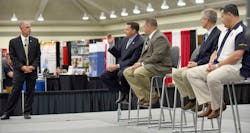FHExpo: Group Tackles Health and Safety Issues
Four key players in the arena of firefighter health and safety addressed a variety of issues during Friday afternoon’s moderated panel “Firefighter Health & Safety—Challenges and Opportunities for Life Longevity” at Firehouse Expo in Baltimore. Firehouse Editor-in-Chief Tim Sendelbach moderated the panel discussion among Fire Chief Michael O'Brian of Brighton Area Fire Authority in Michigan; Division Chief Bryan Frieders, president of the Firefighter Cancer Support Network; Deputy Chief John Tippett of the Charleston, SC, Fire Department; and Iowa City Battalion Chief Eric Nurnberg, who wrote the book Firepsyche.
Each member of the panel has a unique approach to health and safety issues in the fire service. O’Brian has used CrossFit to improve his own personal health and encourages members of his department to adopt healthier lifestyles. He said someone once told him, “If you make chief, you’ve gotta have a regular workout routine.” And so he found one. O’Brian hopes he is setting a strong example for his crew.
Tippett joined the Charleston Fire Department following the death of nine firefighters in the Sofa Super Store Fire in 2007. “The department essentially had to be rebuilt from square one,” Tippett said. “The safety components were taken granted of for years.” Sendelbach added that Charleston now serves as a “model department” for safety.
Nurnberg’s book Firepsyche addresses some of the mental issues associated with firefighting. He addressed the impact stress has on decision-making. “High-risk situations diminish our mental performance and our ability to do our jobs,” he said. “The problem is we don’t train for it.”
Through is work with the Firefighter Cancer Support Network, Frieders aims to raise firefighter awareness of cancer exposure risks. He is also the creator of Rescue Wipes, a product that firefighters and other first responders can use to wipe away toxic carcinogens from their skin or gear. “Cancer is an epidemic in the fire service,” he said. But he added that more and more manufacturers are taking an aggressive stance to deal with cancer exposure, which is a huge step in the right direction.
Sendelbach asked the group how to best change culture as it relates to health and safety issues, and used the example of members thinking they need dirty turnouts to prove that they are a true, salty firefighter. Several panelists mentioned how their departments mitigate exposure to cancer-causing agents by having two sets of turnouts and cleaning gear after calls. Tippett explained that it comes back to constant messaging and reinforcement of positive change in Charleston, noting that the message is clear, “If you want to come to work tomorrow, you have to take care of yourself today.”
An audience member asked the group about heart health and how to ensure firefighters aren’t pushed too hard, leading to cardiac incidents. Tippett explained that in Charleston, firefighters don’t operate on the fireground for extended periods without a break, and that rehab stations are set up to monitor their vital functions.
Sendelbach added that some question why firefighters work out on duty and whether this exertion could stress the body too much before going on a call. O’Brian noted that although the answer is person-to-person, the more physically fit an individual, the more likely they can handle a work cycle. Further, “We have to perform at a moment’s notice,” he said. “And if one person is working out for an hour and the other is taking a nap, I would argue that the person who just worked out is better prepared for the call.” He reiterated that there needs to be balance so a firefighter isn’t overdoing it to the point of zapping themselves before an incident, but that fitness needs to be a priority.
On a related topic, the group addressed how fire department alert systems can have an impact on the heart. Nurnberg explained the physiological side of the body’s response when a call comes in and how younger firefighters’ bodies are better equipped to handle that stress on the heart. He added that there are many warm-up exercises that firefighters can perform—neck rolls, toe taps, etc.—to help mitigate the stress on the heart improve their physical and mental resilience.
Tippett agreed that the alerting systems are sometimes so loud that they can practically shock a person into a cardiac event. In Charleston, they have switched to an automated dispatch program with ramped tones—a system that is making a big difference in how firefighters react. “Success with these systems makes it easier to respond,” he said. Tippett added, though, that it’s more than just the technology. “There’s personal responsibility related to diet, exercise and how you live your life,” he said.
Perhaps the most controversial topic addressed was whether health issues can become punitive and a matter of employment. O’Brian explained that in Michigan, weight is a protected class. As an example, he described a time when the department had to retrofit apparatus components to accommodate a heavier firefighter. He said that the problem was that they should have focused on helping the firefighter lose weight as well. He went on to explain that it can be difficult to get through to some people, similar to some firefighters’ resistance to safety-related change. In the end, though, he admitted that he’s not sure the fire service would ever embrace a mandatory approach to fitness standards.
In conclusion, Sendelbach thanked the panelists for their input and encouraged all members of the fire service to constantly evaluate their performance so that we can make the necessary changes to improve firefighter health and safety.
About the Author

Janelle Foskett
Janelle Foskett served as editorial director of Firehouse Magazine and Firehouse.com, overseeing the editorial operations for the print edition along with working closely with the Web team.
